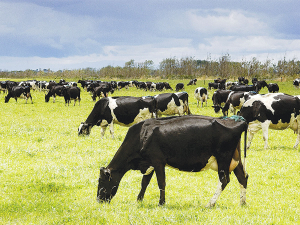DairyNZ Levy Vote Underway as Chair Highlights Seven-Fold Return
Voting has started for the renewal of DairyNZ's milksolids levy.
 A stoush over intellectual property and genomics could be on the horizon as both DairyNZ and LIC disagree on a key issue for the sector.
A stoush over intellectual property and genomics could be on the horizon as both DairyNZ and LIC disagree on a key issue for the sector.
OPINION: It's not common for industry-good body, DairyNZ and farmerowned co-operative LIC to publicly disagree on a key issue facing the dairy sector.
Housed next to each other at the sprawling Ruakura campus, both LIC and DairyNZ represent the interests of 11,000 dairy herds and their owners. This month, DairyNZ came out with its proposal for a single national animal evaluation breeding index that incorporates genomics.
DairyNZ – through subsidiary New Zealand Animal Evaluation Ltd (NZAEL) – believes that creating one animal evaluation index would ensure breeding decisions are made consistently.
This single evaluation will be co-ordinated by NZAEL – a wholly-owned subsidiary of DairyNZ – as an industry-good, credible source of data available to everyone to use.
In other words, this takes the hard-earned genomics database and genomics IP out of the hands of LIC and CRV, two of the sector’s leading genomics companies each with its own breeding worth animal evaluation index.
The sector is currently using three breeding worth animal evaluation indexes. DairyNZ chair Jim van der Poel says this creates confusion in the sector – and sub-optimal outcomes. So, they want things to change.
However, LIC is worried. In a letter to its shareholders, LIC chief executive David Chin didn’t mince his words.
He points out that LIC has already surpassed the DairyNZ proposal’s goal of 15BW and genomics has been a key contributor to this success.
“It is widely available to LIC’s 9000+ farmers and it is delivering significant value on-farm which will benefit your herds for years to come,” Chin told shareholders.
He claims there’s a lack of evidence that there will be value returned to the industry from the model, especially when New Zealand farmers, through LIC, have already made the investment into a state-of-the-art genomic model and made further investments into the collection of over 300,000 genotypes.
Peter Gatley, a former head of LIC’s genetics business, agrees.
Gatley says the attempt by NZAEL to requisition the IP belonging to two independent companies threatens to kill the golden goose.
“New Zealanders do not need reminding that removal of the incentive to get out of bed in the morning and add value results in a death spiral. There is no market failure in genetic improvement. NZAEL is now threatening just that.”
Over the next four weeks, both LIC and DairyNZ will be making their cases to shareholders and levy payers respectively.
It will be interesting to see if LIC and CRV give up their genomics IP to NZAEL without a fight.
Hawke's Bay apple grower Taylor Corporation says a standout 2026 season, coming after a few difficult years, is boosting optimism among growers.
Horticulture New Zealand (HortNZ) has added its perspective to numerous primary sector voices urging the Government to strengthen its draft legislation to replace the Resource Management Act (RMA).
The Commerce Commission has finalised new information disclosure requirements for local councils and water organisations that deliver water supply and wastewater services.
Beef + Lamb NZ (B+LNZ) is calling for significant changes to the Government’s reforms to the Resource Management Act (RMA).
NZPork says the Government needs to strengthen its proposed planning laws to ensure New Zealand's pig farmers can continue to produce pork.
Good news for kiwifruit growers - a record crop with forecast per hectare returns at record levels for all fruit categories for the 2025-26 season.
OPINION: Staying with politics, with less than nine months to go before the general elections, there’s confusion in the Labour…
OPINION: Winston Peters' tirade against the free trade deal stitched with India may not be all political posturing by the…